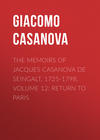Читать книгу: «The Memoirs of Jacques Casanova de Seingalt, 1725-1798. Volume 07: Venice», страница 6
On Monday, the worthy pair being tired, they slept until noon, and after dinner P– C– went out to pay for the goods.
We were to go away early on the Tuesday, and I instinctively longed for that moment. The counts whom P– C– had invited were delighted with his mistress, and they came to supper; but I avoided meeting them.
On the Tuesday morning I was duly informed that breakfast was ready, but as I did not answer the summons quickly enough the servant came up again, and told me that my wife requested me to make haste. Scarcely had the word "wife" escaped his lips than I visited the cheek of the poor fellow with a tremendous smack, and in my rage kicked him downstairs, the bottom of which he reached in four springs, to the imminent risk of his neck. Maddened with rage I entered the breakfast-room, and addressing myself to P– C–, I asked him who was the scoundrel who had announced me in the hotel as the husband of Madame C–. He answered that he did not know; but at the same moment the landlord came into the room with a big knife in his hand, and asked me why I had kicked his servant down the stairs. I quickly drew a pistol, and threatening him with it I demanded imperatively from him the name of the person who had represented me as the husband of that woman.
"Captain P– C–," answered the landlord, "gave the names, profession, etc., of your party."
At this I seized the impudent villain by the throat, and pinning him against the wall with a strong hand I would have broken his head with the butt of my pistol, if the landlord had not prevented me. Madame had pretended to swoon, for those women can always command tears or fainting fits, and the cowardly P– C– kept on saying,
"It is not true, it is not true!"
The landlord ran out to get the hotel register, and he angrily thrust it under the nose of the coward, daring him to deny his having dictated: Captain P– C–, with M. and Madame Casanova. The scoundrel answered that his words had certainly not been heard rightly, and the incensed landlord slapped the book in his face with such force that he sent him rolling, almost stunned, against the wall.
When I saw that the wretched poltroon was receiving such degrading treatment without remembering that he had a sword hanging by his side, I left the room, and asked the landlord to order me a carriage to take me to Padua.
Beside myself with rage, blushing for very shame, seeing but too late the fault I had committed by accepting the society of a scoundrel, I went up to my room, and hurriedly packed up my carpet-bag. I was just going out when Madame C– presented herself before me.
"Begone, madam," I said to her, "or, in my rage, I might forget the respect due to your sex."
She threw herself, crying bitterly, on a chair, entreated me to forgive her, assuring me that she was innocent, and that she was not present when the knave had given the names. The landlady, coming in at that moment, vouched for the truth of her assertion. My anger began to abate, and as I passed near the window I saw the carriage I had ordered waiting for me with a pair of good horses. I called for the landlord in order to pay whatever my share of the expense might come to, but he told me that as I had ordered nothing myself I had nothing to pay. Just at that juncture Count Velo came in.
"I daresay, count," I said, "that you believe this woman to be my wife."
"That is a fact known to everybody in the city."
"Damnation! And you have believed such a thing, knowing that I occupy this room alone, and seeing me leave the ball-room and the supper-table yesterday alone, leaving her with you all!"
"Some husbands are blessed with such easy dispositions!"
"I do not think I look like one of that species, and you are not a judge of men of honour, let us go out, and I undertake to prove it to you."
The count rushed down the stairs and out of the hotel. The miserable C– was choking, and I could not help pitying her; for a woman has in her tears a weapon which through my life I have never known to resist. I considered that if I left the hotel without paying anything, people might laugh at my anger and suppose that I had a share in the swindle; I requested the landlord to bring me the account, intending to pay half of it. He went for it, but another scene awaited me. Madame C–, bathed in tears, fell on her knees, and told me that if I abandoned her she was lost, for she had no money and nothing to leave as security for her hotel bill.
"What, madam! Have you not letters of exchange to the amount of six thousand florins, or the goods bought with them?"
"The goods are no longer here; they have all been taken away, because the letters of exchange, which you saw, and which we considered as good as cash, only made the merchants laugh; they have sent for everything. Oh! who could have supposed it?"
"The scoundrel! He knew it well enough, and that is why he was so anxious to bring me here. Well, it is right that I should pay the penalty of my own folly."
The bill brought by the landlord amounted to forty sequins, a very high figure for three days; but a large portion of that sum was cash advanced by the landlord, I immediately felt that my honour demanded that I should pay the bill in full; and I paid without any hesitation, taking care to get a receipt given in the presence of two witnesses. I then made a present of two sequins to the nephew of the landlord to console him for the thrashing he had received, and I refused the same sum to the wretched C–, who had sent the landlady to beg it for her.
Thus ended that unpleasant adventure, which taught me a lesson, and a lesson which I ought not to have required. Two or three weeks later, I heard that Count Trento had given those two miserable beings some money to enable them to leave the city; as far as I was concerned, I would not have anything to do with them. A month afterwards P– C– was again arrested for debt, the man who had been security for him having become a bankrupt. He had the audacity to write a long letter to me, entreating me to go and see him, but I did not answer him. I was quite as inflexible towards Madame C–, whom I always refused to see. She was reduced to great poverty.
I returned to Padua, where I stopped only long enough to take my ring and to dine with M. de Bragadin, who went back to Venice a few days afterwards.
The messenger from the convent brought me a letter very early in the morning; I devoured its contents; it was very loving, but gave no news. In my answer I gave my dear C– C– the particulars of the infamous trick played upon me by her villainous brother, and mentioned the ring, with the secret of which I acquainted her.
According to the information I had received from C– C–, I placed myself, one morning, so as to see her mother enter the church, into which I followed her. Kneeling close to her, I told her that I wished to speak with her, and she followed me to the cloister. I began by speaking a few consoling words; then I told her that I would remain faithful to her daughter, and I asked her whether she visited her.
"I intend," she said, "to go and kiss my dear child next Sunday, and I shall of course speak of you with her, for I know well enough that she will be delighted to have news of you; but to my great regret I am not at liberty to tell you where she is."
"I do not wish you to tell me, my good mother, but allow me to send her this ring by you. It is the picture of her patroness, and I wish you to entreat her to wear it always on her finger; tell her to look at the image during her daily prayers, for without that protection she can never become my wife. Tell her that, on my side, I address every day a credo to St. James."
Delighted with the piety of my feelings and with the prospect of recommending this new devotion to her daughter, the good woman promised to fulfil my commission. I left her, but not before I had placed in her hand ten sequins which I begged her to force upon her daughter's acceptance to supply herself with the trifles she might require. She accepted, but at the same time she assured me that her father had taken care to provide her with all necessaries. The letter which I received from C– C–, on the following Wednesday, was the expression of the most tender affection and the most lively gratitude. She said that the moment she was alone nothing could be more rapid than the point of the pin which made St. Catherine cut a somersault, and presented to her eager eyes the beloved features of the being who was the whole world to her. "I am constantly kissing you," she added, "even when some of the nuns are looking at me, for whenever they come near me I have only to let the top part of the ring fall back and my dear patroness takes care to conceal everything. All the nuns are highly pleased with my devotion and with the confidence I have in the protection of my blessed patroness, whom they think very much like me in the face." It was nothing but a beautiful face created by the fancy of the painter, but my dear little wife was so lovely that beauty was sure to be like her.
She said, likewise, that the nun who taught her French had offered her fifty sequins for the ring on account of the likeness between her and the portrait of the saint, but not out of veneration for her patroness, whom she turned into ridicule as she read her life. She thanked me for the ten sequins I had sent her, because, her mother having given them to her in the presence of several of the sisters, she was thus enabled to spend a little money without raising the suspicions of those curious and inquisitive nuns. She liked to offer trifling presents to the other boarders, and the money allowed her to gratify that innocent taste.
"My mother," added she, "praised your piety very highly; she is delighted with your feelings of devotion. Never mention again, I beg, the name of my unworthy brother."
For five or six weeks her letters were full of the blessed St. Catherine, who caused her to tremble with fear every time she found herself compelled to trust the ring to the mystic curiosity of the elderly nuns, who, in order to see the likeness better through their spectacles, brought it close to their eyes, and rubbed the enamel. "I am in constant fear," C– C– wrote, "of their pressing the invisible blue spot by chance. What would become of me, if my patroness, jumping up, discovered to their eyes a face—very divine, it is true, but which is not at all like that of a saint? Tell me, what could I do in such a case?"
One month after the second arrest of P– C–, the jeweller, who had taken my security for the ring, called on me for payment of the bill. I made an arrangement with him; and on condition of my giving him twenty sequins, and leaving him every right over the debtor, he exonerated me. From his prison the impudent P– C– harassed me with his cowardly entreaties for alms and assistance.
Croce was in Venice, and engrossed a great share of the general attention. He kept a fine house, an excellent table, and a faro bank with which he emptied the pockets of his dupes. Foreseeing what would happen sooner or later, I had abstained from visiting him at his house, but we were friendly whenever we met. His wife having been delivered of a boy, Croce asked me to stand as god-father, a favour which I thought I could grant; but after the ceremony and the supper which was the consequence of it, I never entered the house of my former partner, and I acted rightly. I wish I had always been as prudent in my conduct.
CHAPTER XV
Croce Is Expelled From Venice—Sgombro—His Infamy and Death—Misfortune Which Befalls My Dear C. C.—I Receive An Anonymous Letter From a Nun, and Answer It—An Amorous Intrigue
My former partner was, as I have said before, a skilful and experienced hand at securing the favours of Fortune; he was driving a good trade in Venice, and as he was amiable, and what is called in society a gentleman, he might have held that excellent footing for a long time, if he had been satisfied with gambling; for the State Inquisitors would have too much to attend to if they wished to compel fools to spare their fortunes, dupes to be prudent, and cheats not to dupe the fools; but, whether through the folly of youth or through a vicious disposition, the cause of his exile was of an extraordinary and disgusting nature.
A Venetian nobleman, noble by birth, but very ignoble in his propensities, called Sgombro, and belonging to the Gritti family, fell deeply in love with him, and Croce, either for fun or from taste, shewed himself very compliant. Unfortunately the reserve commanded by common decency was not a guest at their amorous feats, and the scandal became so notorious that the Government was compelled to notify to Croce the order to quit the city, and to seek his fortune in some other place.
Some time afterwards the infamous Sgombro seduced his own two sons, who were both very young, and, unfortunately for him, he put the youngest in such a state as to render necessary an application to a surgeon. The infamous deed became publicly known, and the poor child confessed that he had not had the courage to refuse obedience to his father. Such obedience was, as a matter of course, not considered as forming a part of the duties which a son owes to his father, and the State Inquisitors sent the disgusting wretch to the citadel of Cataro, where he died after one year of confinement.
It is well known that the air of Cataro is deadly, and that the Tribunal sentences to inhale it only such criminals as are not judged publicly for fear of exciting too deeply the general horror by the publication of the trial.
It was to Cataro that the Council of Ten sent, fifteen years ago, the celebrated advocate Cantarini, a Venetian nobleman, who by his eloquence had made himself master of the great Council, and was on the point of changing the constitution of the State. He died there at the end of the year. As for his accomplices, the Tribunal thought that it was enough to punish the four or five leaders, and to pretend not to know the others, who through fear of punishment returned silently to their allegiance.
That Sgombro, of whom I spoke before, had a charming wife who is still alive, I believe. Her name was Cornelia Gitti; she was as celebrated by her wit as by her beauty, which she kept in spite of her years. Having recovered her liberty through the death of her husband, she knew better than to make herself a second time the prisoner of the Hymenean god; she loved her independence too much; but as she loved pleasure too, she accepted the homage of the lovers who pleased her taste.
One Monday, towards the end of July, my servant woke me at day-break to tell me that Laura wished to speak to me. I foresaw some misfortune, and ordered the servant to shew her in immediately. These are the contents of the letter which she handed to me:
"My dearest, a misfortune has befallen me last evening, and it makes me very miserable because I must keep it a secret from everyone in the convent. I am suffering from a very severe loss of blood, and I do not know what to do, having but very little linen. Laura tells me I shall require a great deal of it if the flow of blood continues. I can take no one into my confidence but you, and I entreat you to send me as much linen as you can. You see that I have been compelled to make a confidante of Laura, who is the only person allowed to enter my room at all times. If I should die, my dear husband, everybody in the convent would, of course, know the cause of my death; but I think of you, and I shudder. What will you do in your grief? Ah, darling love! what a pity!"
I dressed myself hurriedly, plying Laura with questions all the time. She told me plainly that it was a miscarriage, and that it was necessary to act with great discretion in order to save the reputation of my young friend; that after all she required nothing but plenty of linen, and that it would be nothing. Commonplace words of consolation, which did not allay the fearful anxiety under which I was labouring. I went out with Laura, called on a Jew from whom I bought a quantity of sheets and two hundred napkins, and, putting it all in a large bag, I repaired with her to Muran. On our way there I wrote in pencil to my sweetheart, telling her to have entire confidence in Laura, and assuring her that I would not leave Muran until all danger had passed. Before we landed, Laura told me that, in order not to be remarked, I had better conceal myself in her house. At any other time it would have been shutting up the wolf in the sheep-fold. She left me in a miserable-looking small room on the ground floor, and concealing about herself as much linen as she could she hurried to her patient, whom she had not seen since the previous evening. I was in hopes that she would find her out of danger, and I longed to see her come back with that good news.
She was absent about one hour, and when she returned her looks were sad. She told me that my poor friend, having lost a great deal of blood during the night, was in bed in a very weak state, and that all we could do was to pray to God for her, because, if the flooding of the blood did not stop soon, she could not possibly live twenty-four hours.
When I saw the linen which she had concealed under her clothes to bring it out, I could not disguise my horror, and I thought the sight would kill me. I fancied myself in a slaughter-house! Laura, thinking of consoling me, told me that I could rely upon the secret being well kept.
"Ah! what do I care!" I exclaimed. "Provided she lives, let the whole world know that she is my wife!"
At any other time, the foolishness of poor Laura would have made me laugh; but in such a sad moment I had neither the inclination nor the courage to be merry.
"Our dear patient," added Laura, "smiled as she was reading your letter, and she said that, with you so near her, she was certain not to die."
Those words did me good, but a man needs so little to console him or to soothe his grief.
"When the nuns are at their dinner," said Laura, "I will go back to the convent with as much linen as I can conceal about me, and in the mean time I am going to wash all this."
"Has she had any visitors?"
"Oh, yes! all the convent; but no one has any suspicion of the truth."
"But in such hot weather as this she can have only a very light blanket over her, and her visitors must remark the great bulk of the napkins."
"There is no fear of that, because she is sitting up in her bed."
"What does she eat?"
"Nothing, for she must not eat."
Soon afterwards Laura went out, and I followed her. I called upon a physician, where I wasted my time and my money, in order to get from him a long prescription which was useless, for it would have put all the convent in possession of the secret, or, to speak more truly, her secret would have been known to the whole world, for a secret known to a nun soon escapes out of the convent's walls. Besides, the physician of the convent himself would most likely have betrayed it through a spirit of revenge.
I returned sadly to my miserable hole in Laura's house. Half an hour afterwards she came to me, crying bitterly, and she placed in my hands this letter, which was scarcely legible:
"I have not strength enough to write to you, my darling; I am getting weaker and weaker; I am losing all my blood, and I am afraid there is no remedy. I abandon myself to the will of God, and I thank Him for having saved me from dishonour. Do not make yourself unhappy. My only consolation is to know that you are near me. Alas! if I could see you but for one moment I would die happy."
The sight of a dozen napkins brought by Laura made me shudder, and the good woman imagined that she afforded me some consolation by telling me that as much linen could be soaked with a bottle of blood. My mind was not disposed to taste such consolation; I was in despair, and I addressed to myself the fiercest reproaches, upbraiding myself as the cause of the death of that adorable creature. I threw myself on the bed, and remained there, almost stunned, for more than six hours, until Laura's return from the convent with twenty napkins entirely soaked. Night had come on, and she could not go back to her patient until morning. I passed a fearful night without food, without sleep, looking upon myself with horror, and refusing all the kind attentions that Laura's daughters tried to shew me.
It was barely daylight when Laura same to announce to me, in the saddest tone, that my poor friend did not bleed any more. I thought she was dead, and I screamed loudly,
"Oh! she is no more!"
"She is still breathing, sir; but I fear she will not outlive this day, for she is worn out. She can hardly open her eyes, and her pulse is scarcely to be felt."
A weight was taken off me; I was instinctively certain that my darling was saved.
"Laura," I said, "this is not bad news; provided the flooding has ceased entirely, all that is necessary is to give her some light food."
"A physician has been sent for. He will prescribe whatever is right, but to tell you the truth I have not much hope."
"Only give me the assurance that she is still alive."
"Yes, she is, I assure you; but you understand very well that she will not tell the truth to the doctor, and God knows what he will order. I whispered to her not to take anything, and she understood me."
"You are the best of women. Yes, if she does not die from weakness before to-morrow, she is saved; nature and love will have been her doctors."
"May God hear you! I shall be back by twelve."
"Why not before?"
"Because her room will be full of people."
Feeling the need of hope, and almost dead for want of food, I ordered some dinner, and prepared a long letter for my beloved mistress, to be delivered to her when she was well enough to read it. The instants given to repentance are very sad, and I was truly a fit subject for pity. I longed to see Laura again, so as to hear what the doctor had said. I had very good cause for laughing at all sorts of oracles, yet through some unaccountable weakness I longed for that of the doctor; I wanted, before all, to find it a propitious one.
Laura's young daughters waited upon me at dinner; I could not manage to swallow a mouthful, but it amused me to see the three sisters devour my dinner at the first invitation I gave them. The eldest sister, a very fine girl, never raised her large eyes once towards me. The two younger ones seemed to me disposed to be amiable, but if I looked at them it was only to feed my despair and the cruel pangs of repentance.
At last Laura, whom I expected anxiously, came back; she told me that the dear patient remained in the same state of debility; the doctor had been greatly puzzled by her extreme weakness because he did not know to what cause to attribute it. Laura added,
"He has ordered some restoratives and a small quantity of light broth; if she can sleep, he answers for her life. He has likewise desired her to have someone to watch her at night, and she immediately pointed her finger at me, as if she wished me to undertake that office. Now, I promise you never to leave her either night or day, except to bring you news."
I thanked her, assuring her that I would reward her generously. I heard with great pleasure that her mother had paid her a visit, and that she had no suspicion of the real state of things, for she had lavished on her the most tender caresses.
Feeling more at ease I gave six sequins to Laura, one to each of her daughters, and ate something for my supper: I then laid myself down on one of the wretched beds in the room. As soon as the two younger sisters saw me in bed, they undressed themselves without ceremony, and took possession of the second bed which was close by mine. Their innocent confidence pleased me. The eldest sister, who most likely had more practical experience, retired to the adjoining room; she had a lover to whom she was soon to be married. This time, however, I was not possessed with the evil spirit of concupiscence, and I allowed innocence to sleep peacefully without attempting anything against it.
Early the next morning Laura was the bearer of good news. She came in with a cheerful air to announce that the beloved patient had slept well, and that she was going back soon to give her some soup. I felt an almost maddening joy in listening to her, and I thought the oracle of AEsculapius a thousand times more reliable than that of Apollo. But it was not yet time to exult in our victory, for my poor little friend had to recover her strength and to make up for all the blood she had lost; that could be done only by time and careful nursing. I remained another week at Laura's house, which I left only after my dear C– C– had requested me to do so in a letter of four pages. Laura, when I left, wept for joy in seeing herself rewarded by the gift of all the fine linen I had bought for my C– C–, and her daughters were weeping likewise, most probably because, during the ten days I had spent near them, they had not obtained a single kiss from me.
After my return to Venice, I resumed my usual habits; but with a nature like mine how could I possibly remain satisfied without positive love? My only pleasure was to receive a letter from my dear recluse every Wednesday, who advised me to wait patiently rather than to attempt carrying her off. Laura assured me that she had become more lovely than ever, and I longed to see her. An opportunity of gratifying my wishes soon offered itself, and I did not allow it to escape. There was to be a taking of the veil—a ceremony which always attracts a large number of persons. On those occasions the nuns always received a great many visitors, and I thought that the boarders were likely to be in the parlour on such an occasion. I ran no risk of being remarked any more than any other person, for I would mingle with the crowd. I therefore went without saying anything about it to Laura, and without acquainting my dear little wife of my intentions. I thought I would fall, so great was my emotion, when I saw her within four yards from me, and looking at me as if she had been in an ecstatic state. I thought her taller and more womanly, and she certainly seemed to me more beautiful than before. I saw no one but her; she never took her eyes off me, and I was the last to leave that place which on that day struck me as being the temple of happiness.
Three days afterwards I received a letter from her. She painted with such vivid colours the happiness she had felt in seeing me, that I made up my mind to give her that pleasure as often as I could. I answered at once that I would attend mass every Sunday at the church of her convent. It cost me nothing: I could not see her, but I knew that she saw me herself, and her happiness made me perfectly happy. I had nothing to fear, for it was almost impossible that anyone could recognize me in the church which was attended only by the people of Muran.
After hearing two or three masses, I used to take a gondola, the gondolier of which could not feel any curiosity about me. Yet I kept on my guard, for I knew that the father of C– C– wanted her to forget me, and I had no doubt he would have taken her away, God knew where if he had had the slightest suspicion of my being acquainted with the place where he had confined her.
Thus I was reasoning in my fear to lose all opportunity of corresponding with my dear C– C–, but I did not yet know the disposition and the shrewdness of the sainted daughters of the Lord. I did not suppose that there was anything remarkable in my person, at least for the inmates of a convent; but I was yet a novice respecting the curiosity of women, and particularly of unoccupied hearts; I had soon occasion to be convinced.
I had executed my Sunday manoeuvering only for a month or five weeks, when my dear C– C– wrote me jestingly that I had become a living enigma for all the convent, boarders and nuns, not even excepting the old ones. They all expected me anxiously; they warned each other of my arrival, and watched me taking the holy water. They remarked that I never cast a glance toward the grating, behind which were all the inmates of the convent; that I never looked at any of the women coming in or going out of the church. The old nuns said that I was certainly labouring under some deep sorrow, of which I had no hope to be cured except through the protection of the Holy Virgin, and the young ones asserted that I was either melancholy or misanthropic.
My dear wife, who knew better than the others, and had no occasion to lose herself in suppositions, was much amused, and she entertained me by sending me a faithful report of it all. I wrote to her that, if she had any fear of my being recognized I would cease my Sunday visits to the church. She answered that I could not impose upon her a more cruel privation, and she entreated me to continue my visits. I thought it would be prudent, however, to abstain from calling at Laura's house, for fear of the chattering nuns contriving to know it, and discovering in that manner a great deal more than I wished them to find out. But that existence was literally consuming me by slow degrees, and could not last long. Besides, I was made to have a mistress, and to live happily with her. Not knowing what to do with myself, I would gamble, and I almost invariably won; but, in spite of that, weariness had got hold of me and I was getting thinner every day.
With the five thousand sequins which my partner Croce had won for me in Padua I had followed M. Bragadin's advice. I had hired a casino where I held a faro bank in partnership with a matador, who secured me against the frauds of certain noblemen—tyrants, with whom a private citizen is always sure to be in the wrong in my dear country.
On All Saints' Day, in the year 1753, just as, after hearing mass, I was going to step into a gondola to return to Venice, I saw a woman, somewhat in Laura's style who, passing near me, looked at me and dropped a letter. I picked it up, and the woman, seeing me in possession of the epistle, quietly went on. The letter had no address, and the seal represented a running knot. I stepped hurriedly into the gondola, and as soon as we were in the offing I broke the seal. I read the following words.





















